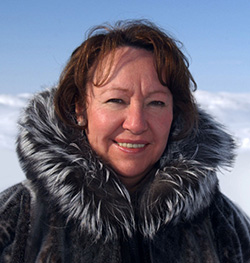The right to be cold

Siila Watt-Cloutier, OC
Human and Indigenous rights advocate
The Arctic of Siila Watt-Cloutier's youth is undergoing a dramatic shift. Global climate change threatens not only its ice-covered landscape, but the lives and livelihood of the people who inhabit it.
Watt-Cloutier believes the challenges Inuit people face-to their environment, their economy, their health and cultural well-being-are connected to the industries we support and the policies we create.
On April 26, 2018 the School of Public Health welcomed Siila Watt-Cloutier for the fourth installment of the Douglas R. Wilson lecture. During the lecture, Watt-Cloutier discussed how environment, economy, policy, health and human rights must be considered collectively.
Please note: This lecture was not recorded.
Siila Watt-Cloutier, OC, is an advocate, a writer, an educator and leader.
Born in Kuujjuak, Nunavik (Northern Quebec), Watt-Cloutier has witnessed the erosion of traditional cultural practices and its profound effect on the physical, mental and social health of Inuit people.
For more than 20 years, she has advocated to influence the processes and policies that endanger traditional ways of northern life, highlighting the impact of global climate change on Indigenous and human rights.
Watt-Cloutier was named an Officer of the Order of Canada in 2006, and in 2007 she was nominated for a Nobel Peace Prize. She is the recipient of the Aboriginal Achievement Award (now Indspire); the United Nations' Champion of the Earth Award; the Norwegian Sophie Prize; and the Right Livelihood Award in 2015, considered to be the "Nobel alternative."
From 1995-2002, Watt-Cloutier served as the Canadian president of the Inuit Circumpolar Council (ICC). In 2002, she was elected international chair of the ICC representing Inuit people of Canada, Greenland, Alaska and Russia, serving until 2006.
Watt-Cloutier is the author of The Right to be Cold: One Woman's Story of Protecting her Culture, the Arctic and the Whole Planet.

